
DIAGEO PLC ________________________________ Dealing in Securities Code ________________________________ Adopted on 3 July 2016 and revised on 29 April 2021 and 24 June 2024
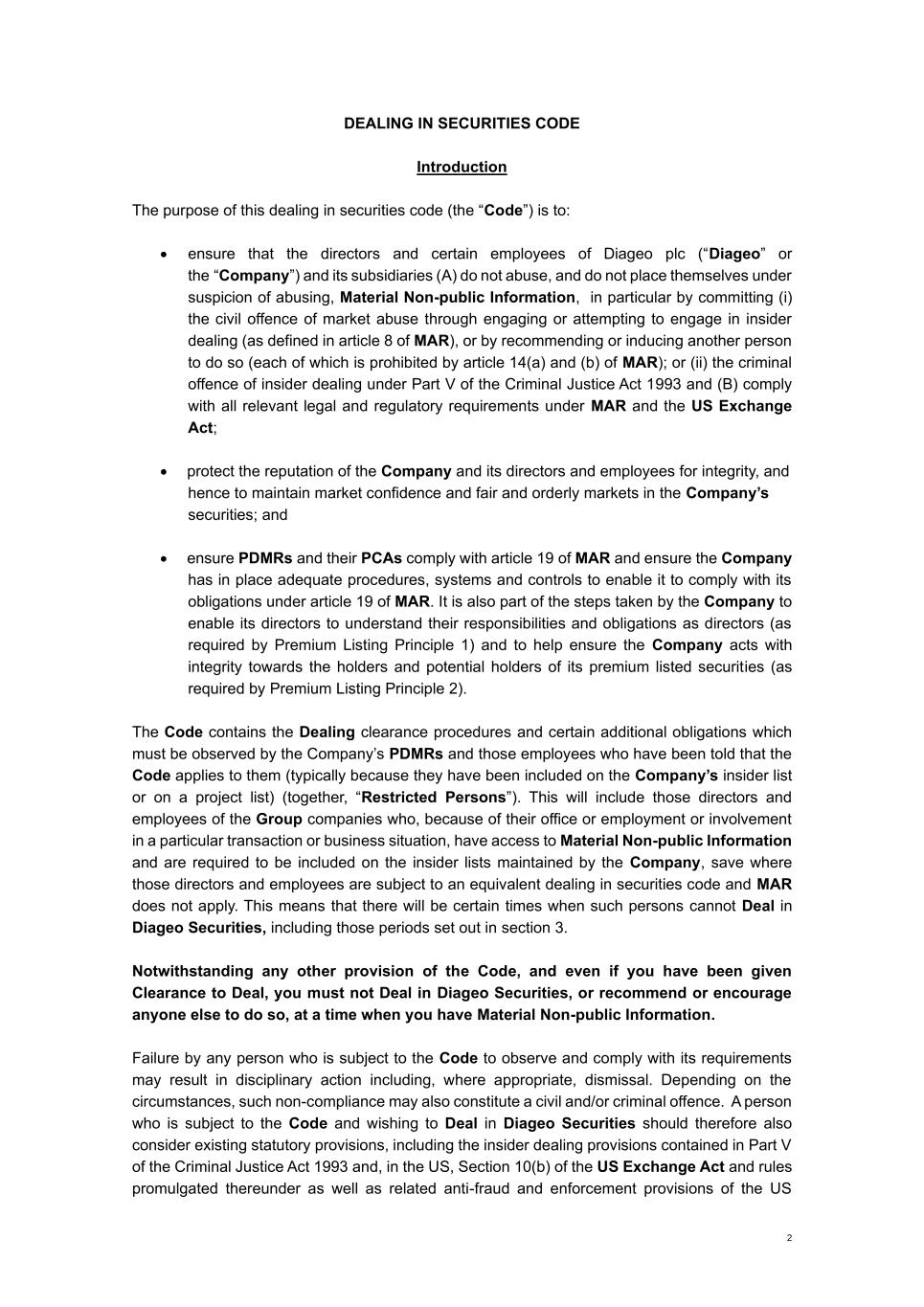
2 DEALING IN SECURITIES CODE Introduction The purpose of this dealing in securities code (the “Code”) is to: • ensure that the directors and certain employees of Diageo plc (“Diageo” or the “Company”) and its subsidiaries (A) do not abuse, and do not place themselves under suspicion of abusing, Material Non-public Information, in particular by committing (i) the civil offence of market abuse through engaging or attempting to engage in insider dealing (as defined in article 8 of MAR), or by recommending or inducing another person to do so (each of which is prohibited by article 14(a) and (b) of MAR); or (ii) the criminal offence of insider dealing under Part V of the Criminal Justice Act 1993 and (B) comply with all relevant legal and regulatory requirements under MAR and the US Exchange Act; • protect the reputation of the Company and its directors and employees for integrity, and hence to maintain market confidence and fair and orderly markets in the Company’s securities; and • ensure PDMRs and their PCAs comply with article 19 of MAR and ensure the Company has in place adequate procedures, systems and controls to enable it to comply with its obligations under article 19 of MAR. It is also part of the steps taken by the Company to enable its directors to understand their responsibilities and obligations as directors (as required by Premium Listing Principle 1) and to help ensure the Company acts with integrity towards the holders and potential holders of its premium listed securities (as required by Premium Listing Principle 2). The Code contains the Dealing clearance procedures and certain additional obligations which must be observed by the Company’s PDMRs and those employees who have been told that the Code applies to them (typically because they have been included on the Company’s insider list or on a project list) (together, “Restricted Persons”). This will include those directors and employees of the Group companies who, because of their office or employment or involvement in a particular transaction or business situation, have access to Material Non-public Information and are required to be included on the insider lists maintained by the Company, save where those directors and employees are subject to an equivalent dealing in securities code and MAR does not apply. This means that there will be certain times when such persons cannot Deal in Diageo Securities, including those periods set out in section 3. Notwithstanding any other provision of the Code, and even if you have been given Clearance to Deal, you must not Deal in Diageo Securities, or recommend or encourage anyone else to do so, at a time when you have Material Non-public Information. Failure by any person who is subject to the Code to observe and comply with its requirements may result in disciplinary action including, where appropriate, dismissal. Depending on the circumstances, such non-compliance may also constitute a civil and/or criminal offence. A person who is subject to the Code and wishing to Deal in Diageo Securities should therefore also consider existing statutory provisions, including the insider dealing provisions contained in Part V of the Criminal Justice Act 1993 and, in the US, Section 10(b) of the US Exchange Act and rules promulgated thereunder as well as related anti-fraud and enforcement provisions of the US
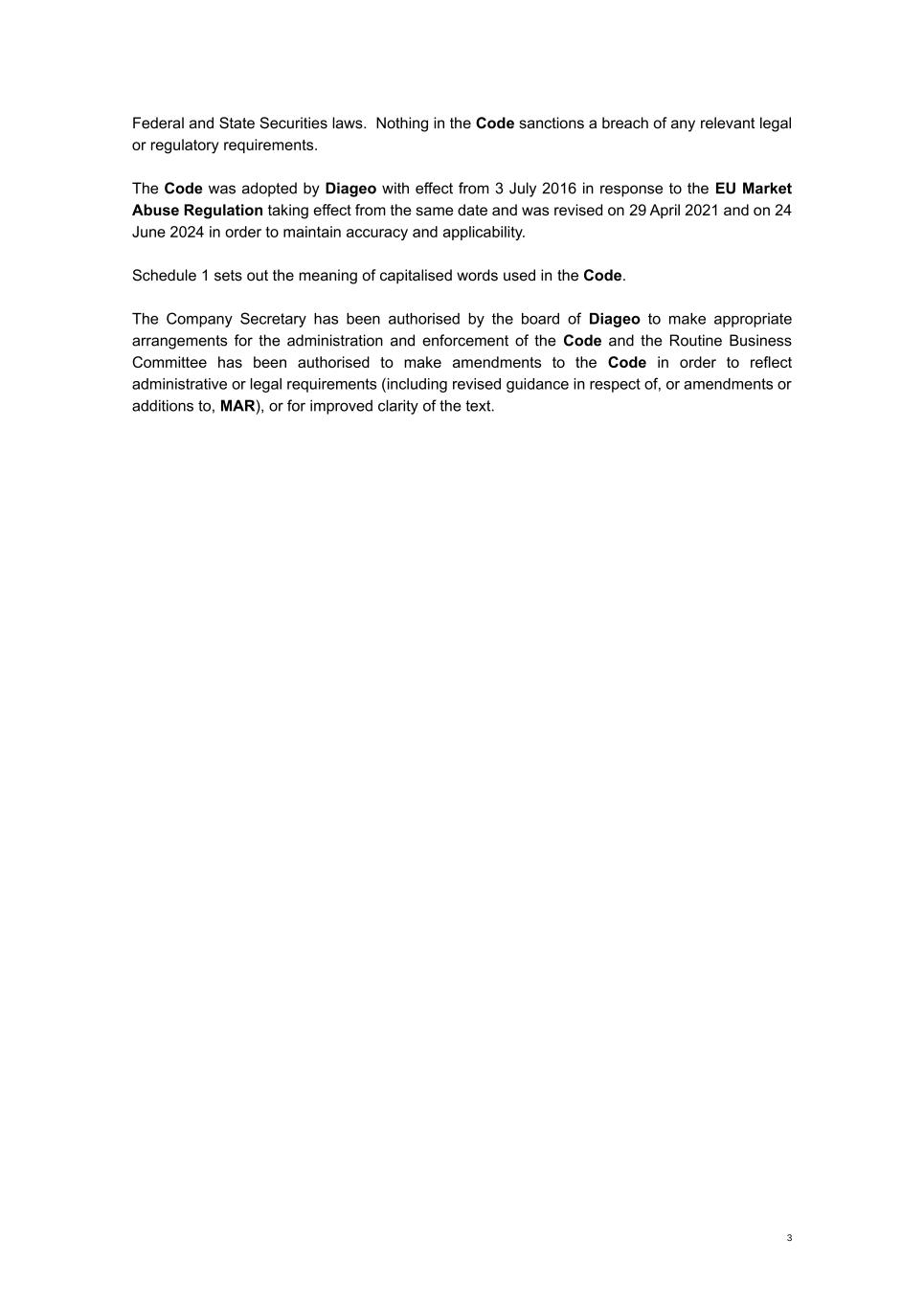
3 Federal and State Securities laws. Nothing in the Code sanctions a breach of any relevant legal or regulatory requirements. The Code was adopted by Diageo with effect from 3 July 2016 in response to the EU Market Abuse Regulation taking effect from the same date and was revised on 29 April 2021 and on 24 June 2024 in order to maintain accuracy and applicability. Schedule 1 sets out the meaning of capitalised words used in the Code. The Company Secretary has been authorised by the board of Diageo to make appropriate arrangements for the administration and enforcement of the Code and the Routine Business Committee has been authorised to make amendments to the Code in order to reflect administrative or legal requirements (including revised guidance in respect of, or amendments or additions to, MAR), or for improved clarity of the text.
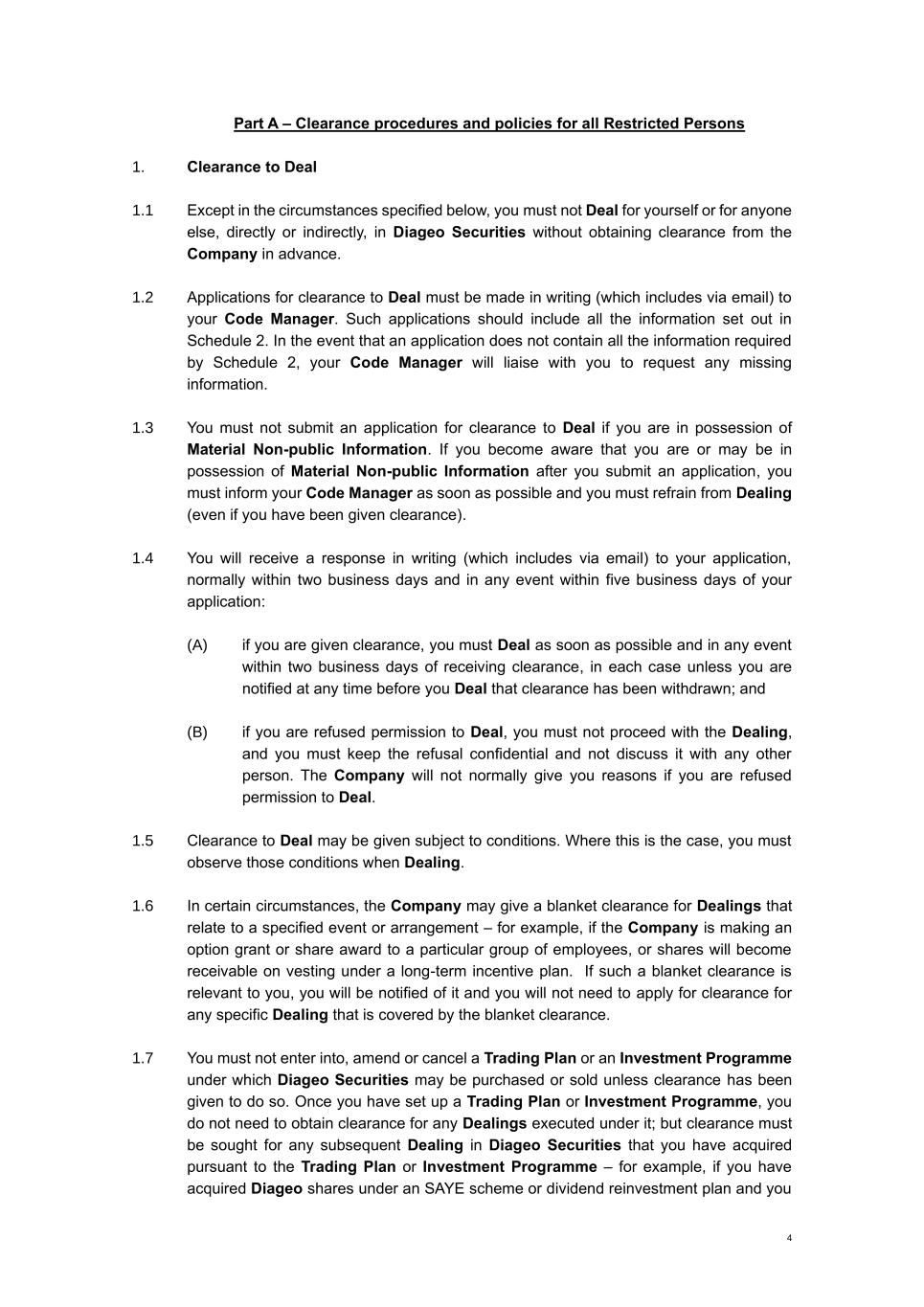
4 Part A – Clearance procedures and policies for all Restricted Persons 1. Clearance to Deal 1.1 Except in the circumstances specified below, you must not Deal for yourself or for anyone else, directly or indirectly, in Diageo Securities without obtaining clearance from the Company in advance. 1.2 Applications for clearance to Deal must be made in writing (which includes via email) to your Code Manager. Such applications should include all the information set out in Schedule 2. In the event that an application does not contain all the information required by Schedule 2, your Code Manager will liaise with you to request any missing information. 1.3 You must not submit an application for clearance to Deal if you are in possession of Material Non-public Information. If you become aware that you are or may be in possession of Material Non-public Information after you submit an application, you must inform your Code Manager as soon as possible and you must refrain from Dealing (even if you have been given clearance). 1.4 You will receive a response in writing (which includes via email) to your application, normally within two business days and in any event within five business days of your application: (A) if you are given clearance, you must Deal as soon as possible and in any event within two business days of receiving clearance, in each case unless you are notified at any time before you Deal that clearance has been withdrawn; and (B) if you are refused permission to Deal, you must not proceed with the Dealing, and you must keep the refusal confidential and not discuss it with any other person. The Company will not normally give you reasons if you are refused permission to Deal. 1.5 Clearance to Deal may be given subject to conditions. Where this is the case, you must observe those conditions when Dealing. 1.6 In certain circumstances, the Company may give a blanket clearance for Dealings that relate to a specified event or arrangement – for example, if the Company is making an option grant or share award to a particular group of employees, or shares will become receivable on vesting under a long-term incentive plan. If such a blanket clearance is relevant to you, you will be notified of it and you will not need to apply for clearance for any specific Dealing that is covered by the blanket clearance. 1.7 You must not enter into, amend or cancel a Trading Plan or an Investment Programme under which Diageo Securities may be purchased or sold unless clearance has been given to do so. Once you have set up a Trading Plan or Investment Programme, you do not need to obtain clearance for any Dealings executed under it; but clearance must be sought for any subsequent Dealing in Diageo Securities that you have acquired pursuant to the Trading Plan or Investment Programme – for example, if you have acquired Diageo shares under an SAYE scheme or dividend reinvestment plan and you
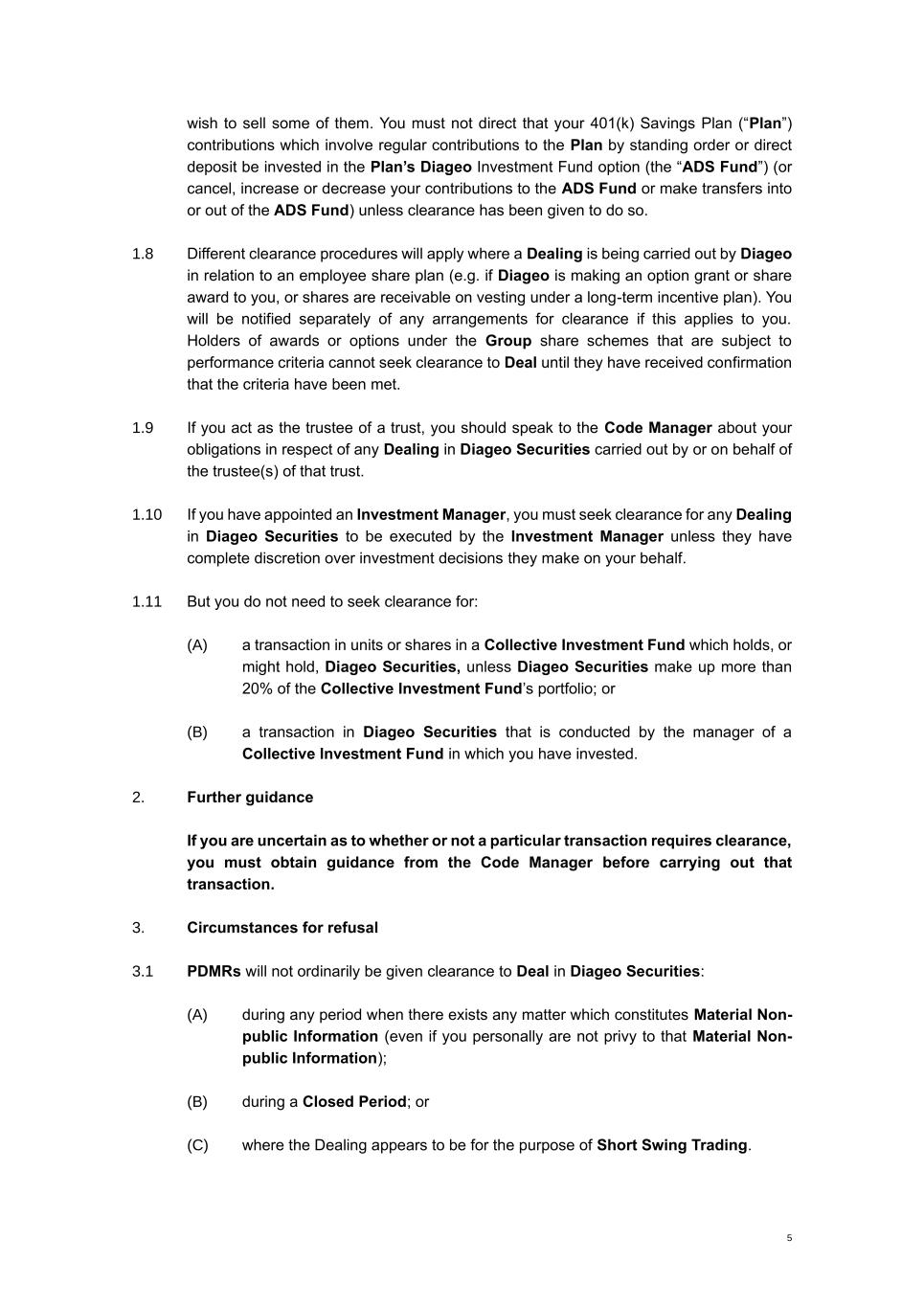
5 wish to sell some of them. You must not direct that your 401(k) Savings Plan (“Plan”) contributions which involve regular contributions to the Plan by standing order or direct deposit be invested in the Plan’s Diageo Investment Fund option (the “ADS Fund”) (or cancel, increase or decrease your contributions to the ADS Fund or make transfers into or out of the ADS Fund) unless clearance has been given to do so. 1.8 Different clearance procedures will apply where a Dealing is being carried out by Diageo in relation to an employee share plan (e.g. if Diageo is making an option grant or share award to you, or shares are receivable on vesting under a long-term incentive plan). You will be notified separately of any arrangements for clearance if this applies to you. Holders of awards or options under the Group share schemes that are subject to performance criteria cannot seek clearance to Deal until they have received confirmation that the criteria have been met. 1.9 If you act as the trustee of a trust, you should speak to the Code Manager about your obligations in respect of any Dealing in Diageo Securities carried out by or on behalf of the trustee(s) of that trust. 1.10 If you have appointed an Investment Manager, you must seek clearance for any Dealing in Diageo Securities to be executed by the Investment Manager unless they have complete discretion over investment decisions they make on your behalf. 1.11 But you do not need to seek clearance for: (A) a transaction in units or shares in a Collective Investment Fund which holds, or might hold, Diageo Securities, unless Diageo Securities make up more than 20% of the Collective Investment Fund’s portfolio; or (B) a transaction in Diageo Securities that is conducted by the manager of a Collective Investment Fund in which you have invested. 2. Further guidance If you are uncertain as to whether or not a particular transaction requires clearance, you must obtain guidance from the Code Manager before carrying out that transaction. 3. Circumstances for refusal 3.1 PDMRs will not ordinarily be given clearance to Deal in Diageo Securities: (A) during any period when there exists any matter which constitutes Material Non- public Information (even if you personally are not privy to that Material Non- public Information); (B) during a Closed Period; or (C) where the Dealing appears to be for the purpose of Short Swing Trading.
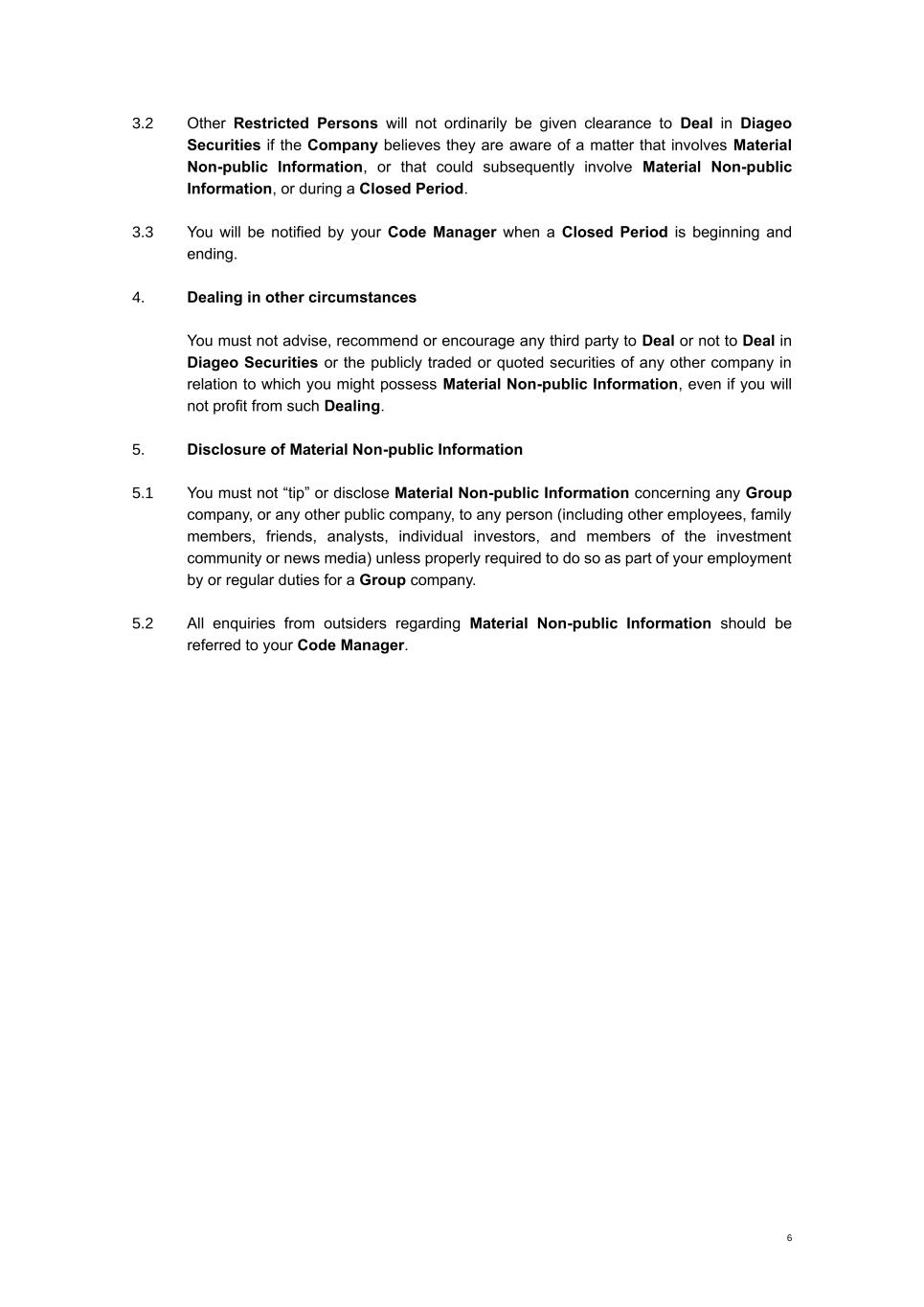
6 3.2 Other Restricted Persons will not ordinarily be given clearance to Deal in Diageo Securities if the Company believes they are aware of a matter that involves Material Non-public Information, or that could subsequently involve Material Non-public Information, or during a Closed Period. 3.3 You will be notified by your Code Manager when a Closed Period is beginning and ending. 4. Dealing in other circumstances You must not advise, recommend or encourage any third party to Deal or not to Deal in Diageo Securities or the publicly traded or quoted securities of any other company in relation to which you might possess Material Non-public Information, even if you will not profit from such Dealing. 5. Disclosure of Material Non-public Information 5.1 You must not “tip” or disclose Material Non-public Information concerning any Group company, or any other public company, to any person (including other employees, family members, friends, analysts, individual investors, and members of the investment community or news media) unless properly required to do so as part of your employment by or regular duties for a Group company. 5.2 All enquiries from outsiders regarding Material Non-public Information should be referred to your Code Manager.
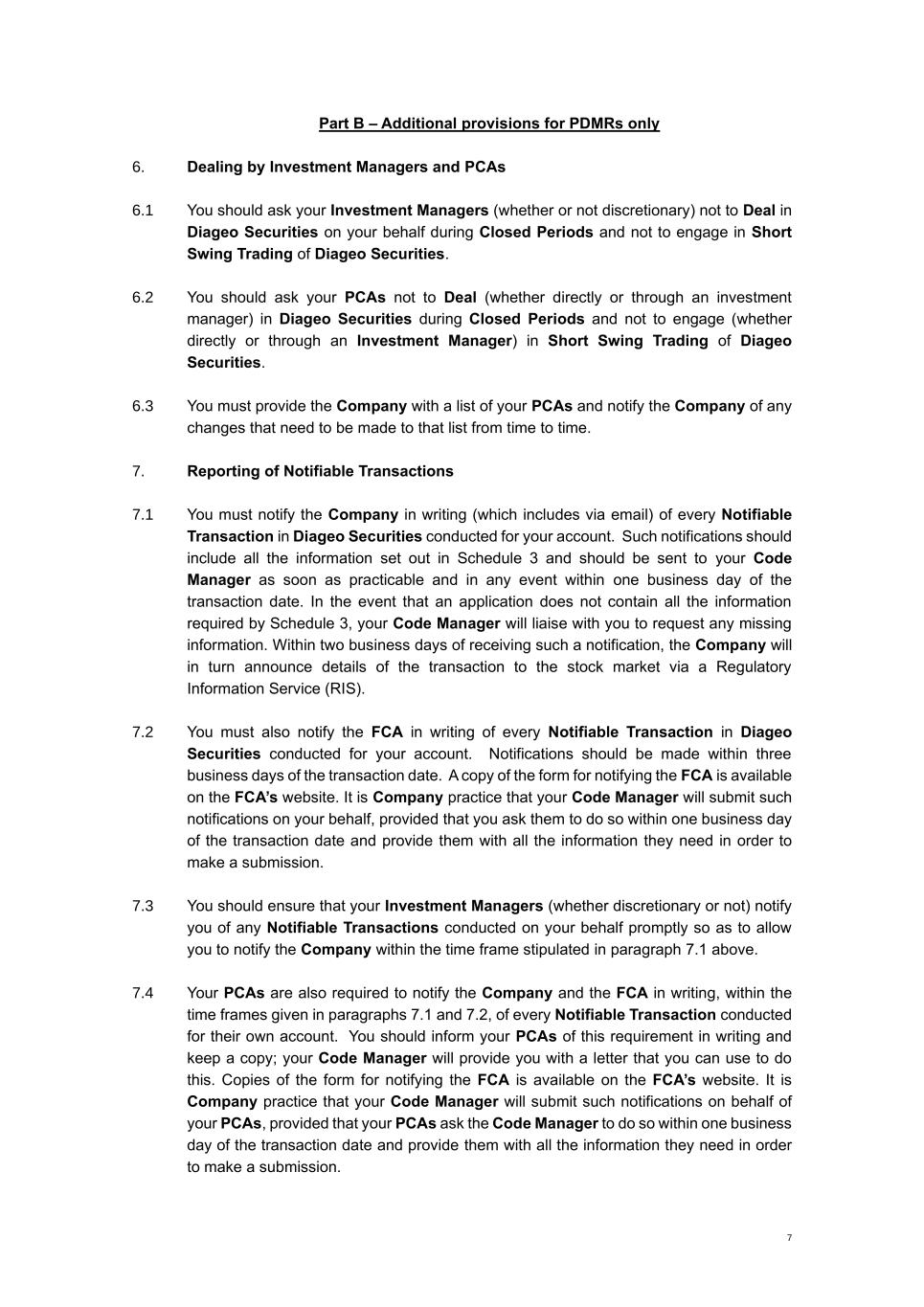
7 Part B – Additional provisions for PDMRs only 6. Dealing by Investment Managers and PCAs 6.1 You should ask your Investment Managers (whether or not discretionary) not to Deal in Diageo Securities on your behalf during Closed Periods and not to engage in Short Swing Trading of Diageo Securities. 6.2 You should ask your PCAs not to Deal (whether directly or through an investment manager) in Diageo Securities during Closed Periods and not to engage (whether directly or through an Investment Manager) in Short Swing Trading of Diageo Securities. 6.3 You must provide the Company with a list of your PCAs and notify the Company of any changes that need to be made to that list from time to time. 7. Reporting of Notifiable Transactions 7.1 You must notify the Company in writing (which includes via email) of every Notifiable Transaction in Diageo Securities conducted for your account. Such notifications should include all the information set out in Schedule 3 and should be sent to your Code Manager as soon as practicable and in any event within one business day of the transaction date. In the event that an application does not contain all the information required by Schedule 3, your Code Manager will liaise with you to request any missing information. Within two business days of receiving such a notification, the Company will in turn announce details of the transaction to the stock market via a Regulatory Information Service (RIS). 7.2 You must also notify the FCA in writing of every Notifiable Transaction in Diageo Securities conducted for your account. Notifications should be made within three business days of the transaction date. A copy of the form for notifying the FCA is available on the FCA’s website. It is Company practice that your Code Manager will submit such notifications on your behalf, provided that you ask them to do so within one business day of the transaction date and provide them with all the information they need in order to make a submission. 7.3 You should ensure that your Investment Managers (whether discretionary or not) notify you of any Notifiable Transactions conducted on your behalf promptly so as to allow you to notify the Company within the time frame stipulated in paragraph 7.1 above. 7.4 Your PCAs are also required to notify the Company and the FCA in writing, within the time frames given in paragraphs 7.1 and 7.2, of every Notifiable Transaction conducted for their own account. You should inform your PCAs of this requirement in writing and keep a copy; your Code Manager will provide you with a letter that you can use to do this. Copies of the form for notifying the FCA is available on the FCA’s website. It is Company practice that your Code Manager will submit such notifications on behalf of your PCAs, provided that your PCAs ask the Code Manager to do so within one business day of the transaction date and provide them with all the information they need in order to make a submission.
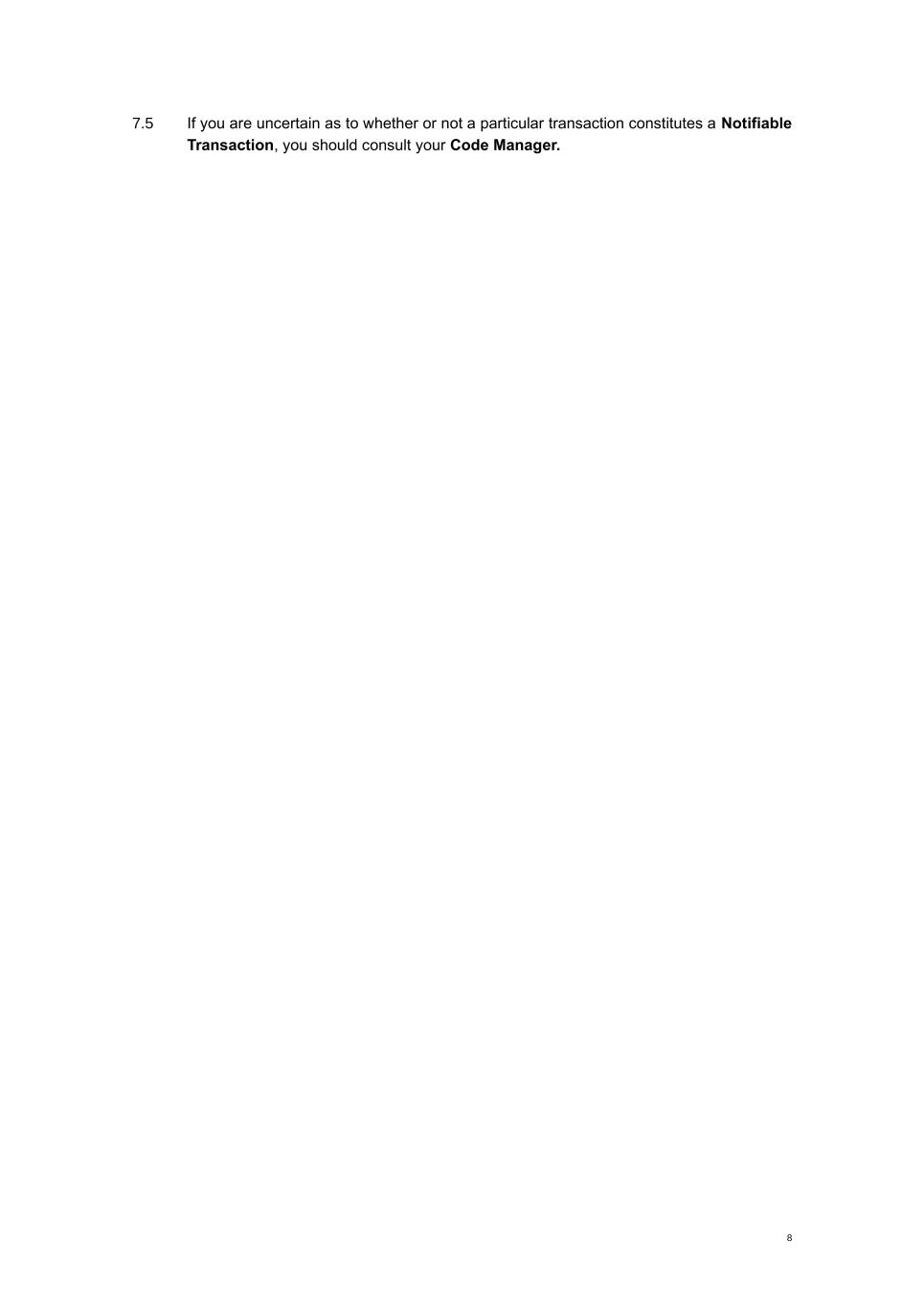
8 7.5 If you are uncertain as to whether or not a particular transaction constitutes a Notifiable Transaction, you should consult your Code Manager.
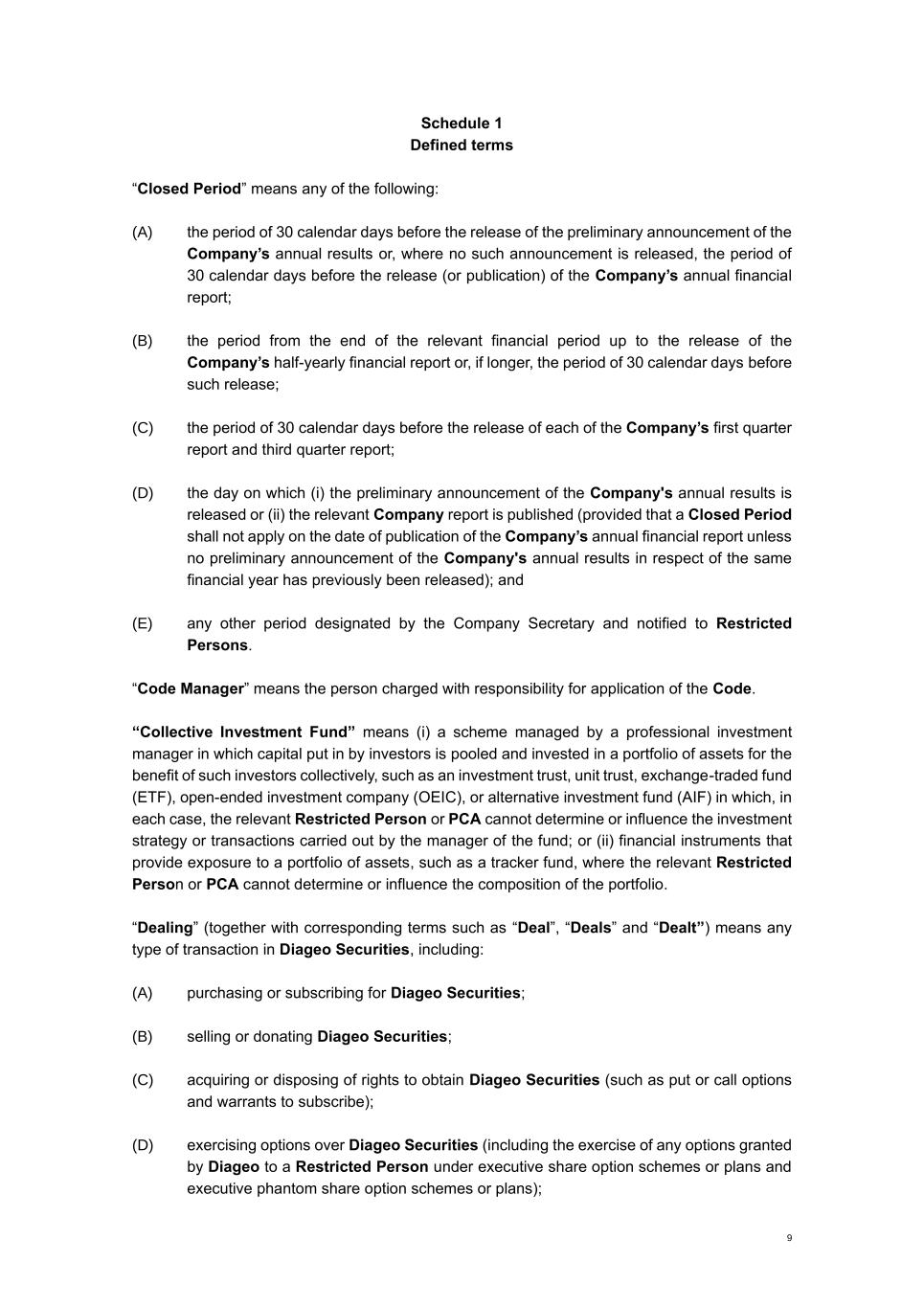
9 Schedule 1 Defined terms “Closed Period” means any of the following: (A) the period of 30 calendar days before the release of the preliminary announcement of the Company’s annual results or, where no such announcement is released, the period of 30 calendar days before the release (or publication) of the Company’s annual financial report; (B) the period from the end of the relevant financial period up to the release of the Company’s half-yearly financial report or, if longer, the period of 30 calendar days before such release; (C) the period of 30 calendar days before the release of each of the Company’s first quarter report and third quarter report; (D) the day on which (i) the preliminary announcement of the Company's annual results is released or (ii) the relevant Company report is published (provided that a Closed Period shall not apply on the date of publication of the Company’s annual financial report unless no preliminary announcement of the Company's annual results in respect of the same financial year has previously been released); and (E) any other period designated by the Company Secretary and notified to Restricted Persons. “Code Manager” means the person charged with responsibility for application of the Code. “Collective Investment Fund” means (i) a scheme managed by a professional investment manager in which capital put in by investors is pooled and invested in a portfolio of assets for the benefit of such investors collectively, such as an investment trust, unit trust, exchange-traded fund (ETF), open-ended investment company (OEIC), or alternative investment fund (AIF) in which, in each case, the relevant Restricted Person or PCA cannot determine or influence the investment strategy or transactions carried out by the manager of the fund; or (ii) financial instruments that provide exposure to a portfolio of assets, such as a tracker fund, where the relevant Restricted Person or PCA cannot determine or influence the composition of the portfolio. “Dealing” (together with corresponding terms such as “Deal”, “Deals” and “Dealt”) means any type of transaction in Diageo Securities, including: (A) purchasing or subscribing for Diageo Securities; (B) selling or donating Diageo Securities; (C) acquiring or disposing of rights to obtain Diageo Securities (such as put or call options and warrants to subscribe); (D) exercising options over Diageo Securities (including the exercise of any options granted by Diageo to a Restricted Person under executive share option schemes or plans and executive phantom share option schemes or plans);
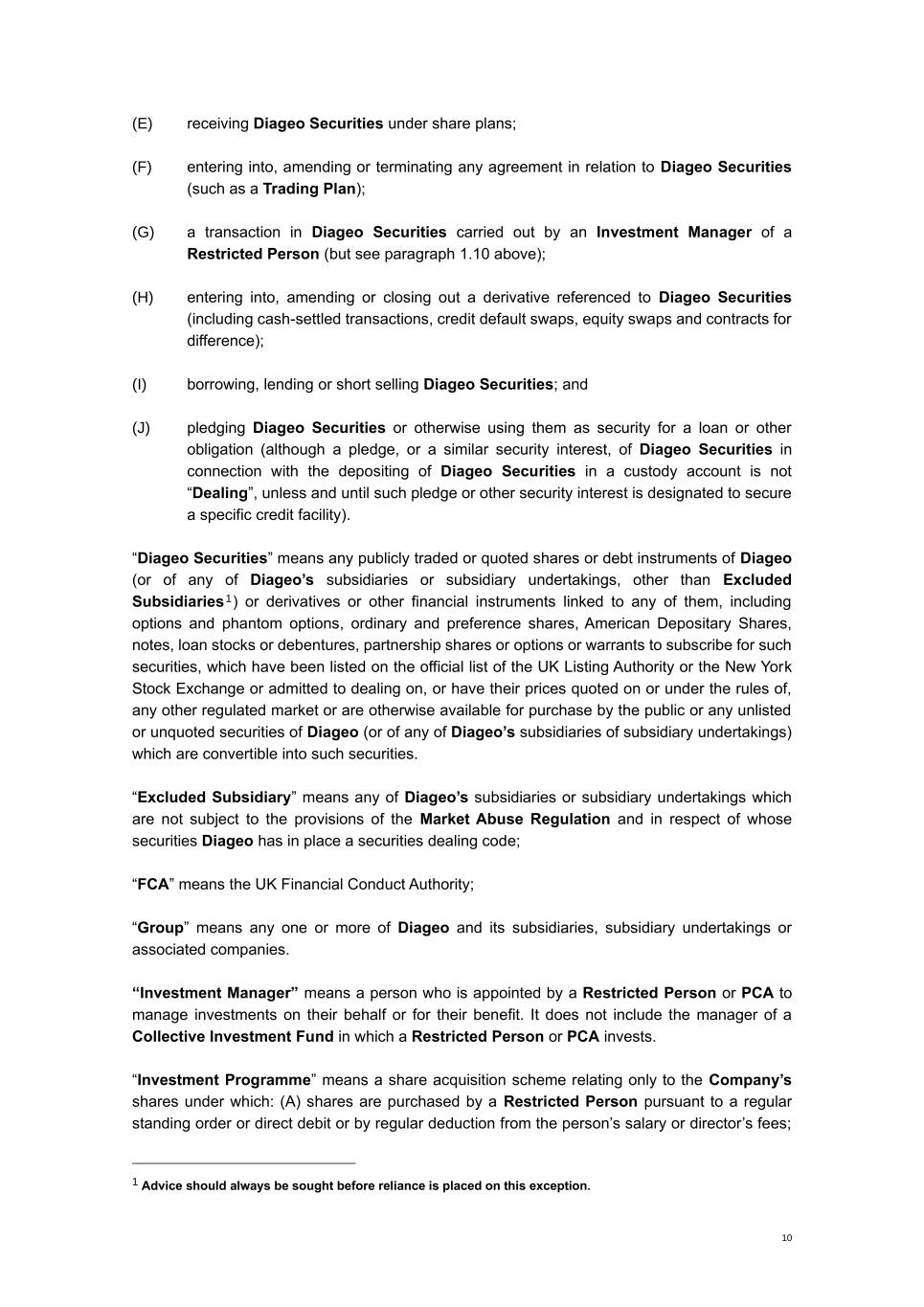
10 (E) receiving Diageo Securities under share plans; (F) entering into, amending or terminating any agreement in relation to Diageo Securities (such as a Trading Plan); (G) a transaction in Diageo Securities carried out by an Investment Manager of a Restricted Person (but see paragraph 1.10 above); (H) entering into, amending or closing out a derivative referenced to Diageo Securities (including cash-settled transactions, credit default swaps, equity swaps and contracts for difference); (I) borrowing, lending or short selling Diageo Securities; and (J) pledging Diageo Securities or otherwise using them as security for a loan or other obligation (although a pledge, or a similar security interest, of Diageo Securities in connection with the depositing of Diageo Securities in a custody account is not “Dealing”, unless and until such pledge or other security interest is designated to secure a specific credit facility). “Diageo Securities” means any publicly traded or quoted shares or debt instruments of Diageo (or of any of Diageo’s subsidiaries or subsidiary undertakings, other than Excluded Subsidiaries1 ) or derivatives or other financial instruments linked to any of them, including options and phantom options, ordinary and preference shares, American Depositary Shares, notes, loan stocks or debentures, partnership shares or options or warrants to subscribe for such securities, which have been listed on the official list of the UK Listing Authority or the New York Stock Exchange or admitted to dealing on, or have their prices quoted on or under the rules of, any other regulated market or are otherwise available for purchase by the public or any unlisted or unquoted securities of Diageo (or of any of Diageo’s subsidiaries of subsidiary undertakings) which are convertible into such securities. “Excluded Subsidiary” means any of Diageo’s subsidiaries or subsidiary undertakings which are not subject to the provisions of the Market Abuse Regulation and in respect of whose securities Diageo has in place a securities dealing code; “FCA” means the UK Financial Conduct Authority; “Group” means any one or more of Diageo and its subsidiaries, subsidiary undertakings or associated companies. “Investment Manager” means a person who is appointed by a Restricted Person or PCA to manage investments on their behalf or for their benefit. It does not include the manager of a Collective Investment Fund in which a Restricted Person or PCA invests. “Investment Programme” means a share acquisition scheme relating only to the Company’s shares under which: (A) shares are purchased by a Restricted Person pursuant to a regular standing order or direct debit or by regular deduction from the person’s salary or director’s fees; 1 Advice should always be sought before reliance is placed on this exception.
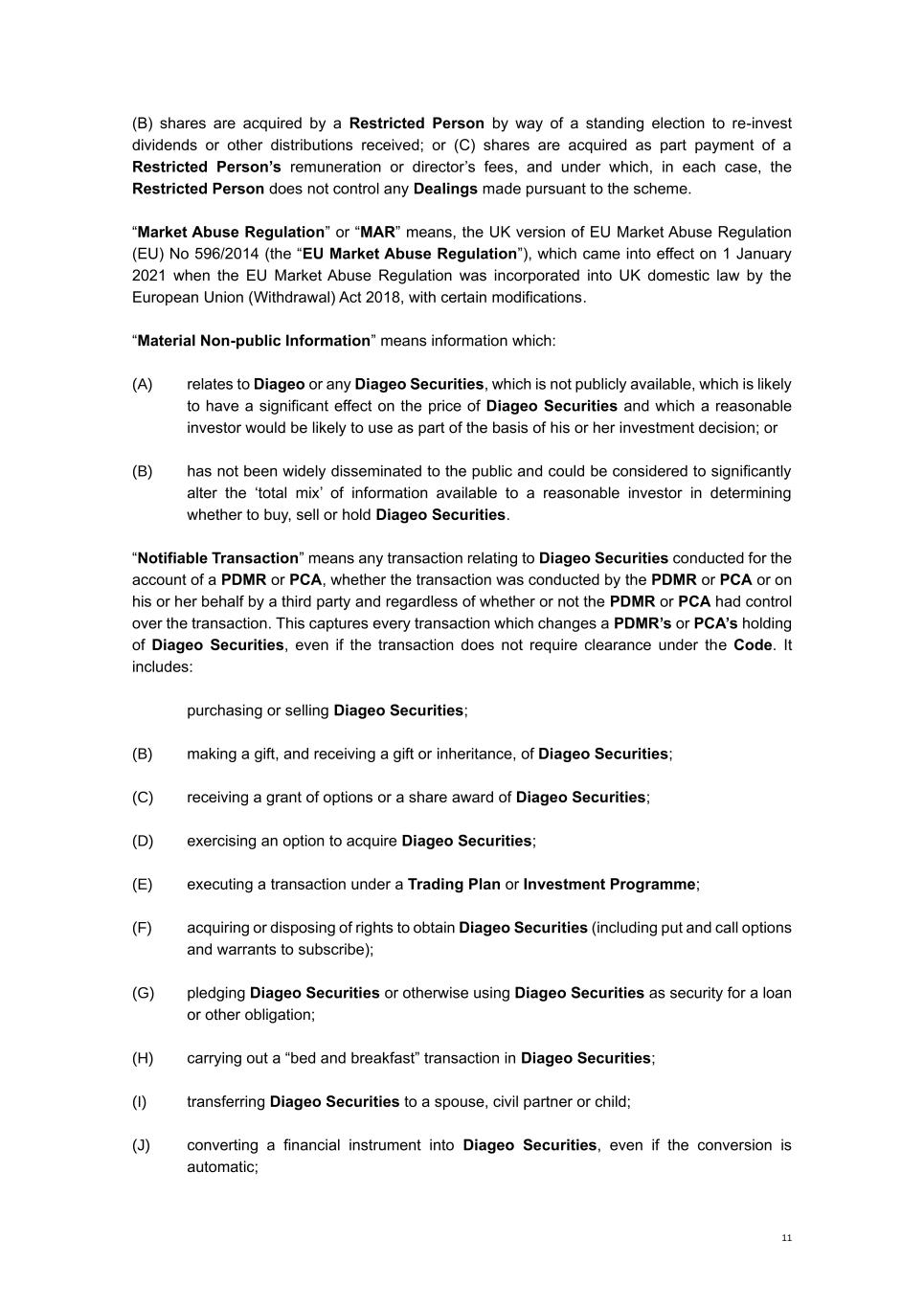
11 (B) shares are acquired by a Restricted Person by way of a standing election to re-invest dividends or other distributions received; or (C) shares are acquired as part payment of a Restricted Person’s remuneration or director’s fees, and under which, in each case, the Restricted Person does not control any Dealings made pursuant to the scheme. “Market Abuse Regulation” or “MAR” means, the UK version of EU Market Abuse Regulation (EU) No 596/2014 (the “EU Market Abuse Regulation”), which came into effect on 1 January 2021 when the EU Market Abuse Regulation was incorporated into UK domestic law by the European Union (Withdrawal) Act 2018, with certain modifications. “Material Non-public Information” means information which: (A) relates to Diageo or any Diageo Securities, which is not publicly available, which is likely to have a significant effect on the price of Diageo Securities and which a reasonable investor would be likely to use as part of the basis of his or her investment decision; or (B) has not been widely disseminated to the public and could be considered to significantly alter the ‘total mix’ of information available to a reasonable investor in determining whether to buy, sell or hold Diageo Securities. “Notifiable Transaction” means any transaction relating to Diageo Securities conducted for the account of a PDMR or PCA, whether the transaction was conducted by the PDMR or PCA or on his or her behalf by a third party and regardless of whether or not the PDMR or PCA had control over the transaction. This captures every transaction which changes a PDMR’s or PCA’s holding of Diageo Securities, even if the transaction does not require clearance under the Code. It includes: purchasing or selling Diageo Securities; (B) making a gift, and receiving a gift or inheritance, of Diageo Securities; (C) receiving a grant of options or a share award of Diageo Securities; (D) exercising an option to acquire Diageo Securities; (E) executing a transaction under a Trading Plan or Investment Programme; (F) acquiring or disposing of rights to obtain Diageo Securities (including put and call options and warrants to subscribe); (G) pledging Diageo Securities or otherwise using Diageo Securities as security for a loan or other obligation; (H) carrying out a “bed and breakfast” transaction in Diageo Securities; (I) transferring Diageo Securities to a spouse, civil partner or child; (J) converting a financial instrument into Diageo Securities, even if the conversion is automatic;
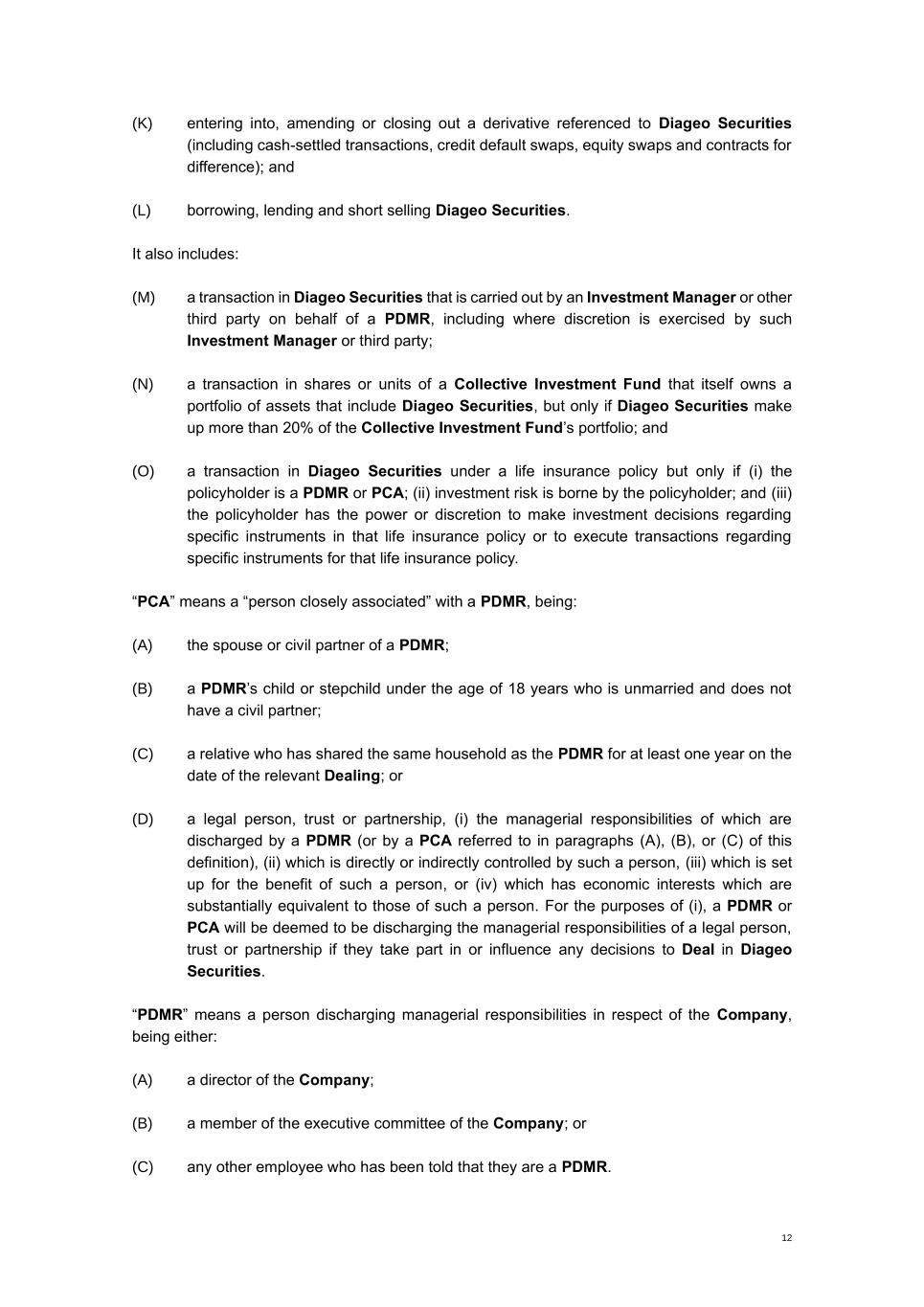
12 (K) entering into, amending or closing out a derivative referenced to Diageo Securities (including cash-settled transactions, credit default swaps, equity swaps and contracts for difference); and (L) borrowing, lending and short selling Diageo Securities. It also includes: (M) a transaction in Diageo Securities that is carried out by an Investment Manager or other third party on behalf of a PDMR, including where discretion is exercised by such Investment Manager or third party; (N) a transaction in shares or units of a Collective Investment Fund that itself owns a portfolio of assets that include Diageo Securities, but only if Diageo Securities make up more than 20% of the Collective Investment Fund’s portfolio; and (O) a transaction in Diageo Securities under a life insurance policy but only if (i) the policyholder is a PDMR or PCA; (ii) investment risk is borne by the policyholder; and (iii) the policyholder has the power or discretion to make investment decisions regarding specific instruments in that life insurance policy or to execute transactions regarding specific instruments for that life insurance policy. “PCA” means a “person closely associated” with a PDMR, being: (A) the spouse or civil partner of a PDMR; (B) a PDMR’s child or stepchild under the age of 18 years who is unmarried and does not have a civil partner; (C) a relative who has shared the same household as the PDMR for at least one year on the date of the relevant Dealing; or (D) a legal person, trust or partnership, (i) the managerial responsibilities of which are discharged by a PDMR (or by a PCA referred to in paragraphs (A), (B), or (C) of this definition), (ii) which is directly or indirectly controlled by such a person, (iii) which is set up for the benefit of such a person, or (iv) which has economic interests which are substantially equivalent to those of such a person. For the purposes of (i), a PDMR or PCA will be deemed to be discharging the managerial responsibilities of a legal person, trust or partnership if they take part in or influence any decisions to Deal in Diageo Securities. “PDMR” means a person discharging managerial responsibilities in respect of the Company, being either: (A) a director of the Company; (B) a member of the executive committee of the Company; or (C) any other employee who has been told that they are a PDMR.

13 “Restricted Person” means: (A) a PDMR; or (B) any other person who has been told by the Company that the Code applies to them. “Short Swing Trading” means Dealing in a way that attempts to take advantage of short- to medium-term price movements in a Diageo Security. For example, selling Diageo Securities that were acquired less than a year previously will usually be considered to be Short Swing Trading. “Trading Plan” means a written plan entered into by a Restricted Person or PCA and an independent third party that sets out a strategy for the acquisition and/or disposal of Diageo Securities by the Restricted Person or PCA, and: (A) specifies the amount of Diageo Securities to be Dealt in and the price at which and the date on which the Diageo Securities are to be Dealt in; (B) includes a method (including a written formula, algorithm or computer program) for determining the amount of Diageo Securities to be Dealt in and the price at which and the date on which the Diageo Securities are to be Dealt in; or (C) both: (i) gives discretion to that independent third party to make trading decisions about the amount of Diageo Securities to be Dealt in and the price at which and the date on which the Diageo Securities are to be Dealt in; and (ii) does not permit the Restricted Person to exercise any subsequent influence over how, when, or whether to Deal in Diageo Securities; provided, in addition, that the independent third party who, pursuant to such plan, does exercise such influence must not be aware of any Material Non-public Information when doing so. “US Exchange Act” means the United States Securities Exchange Act of 1934, as amended, and the rules and regulations promulgated thereunder.
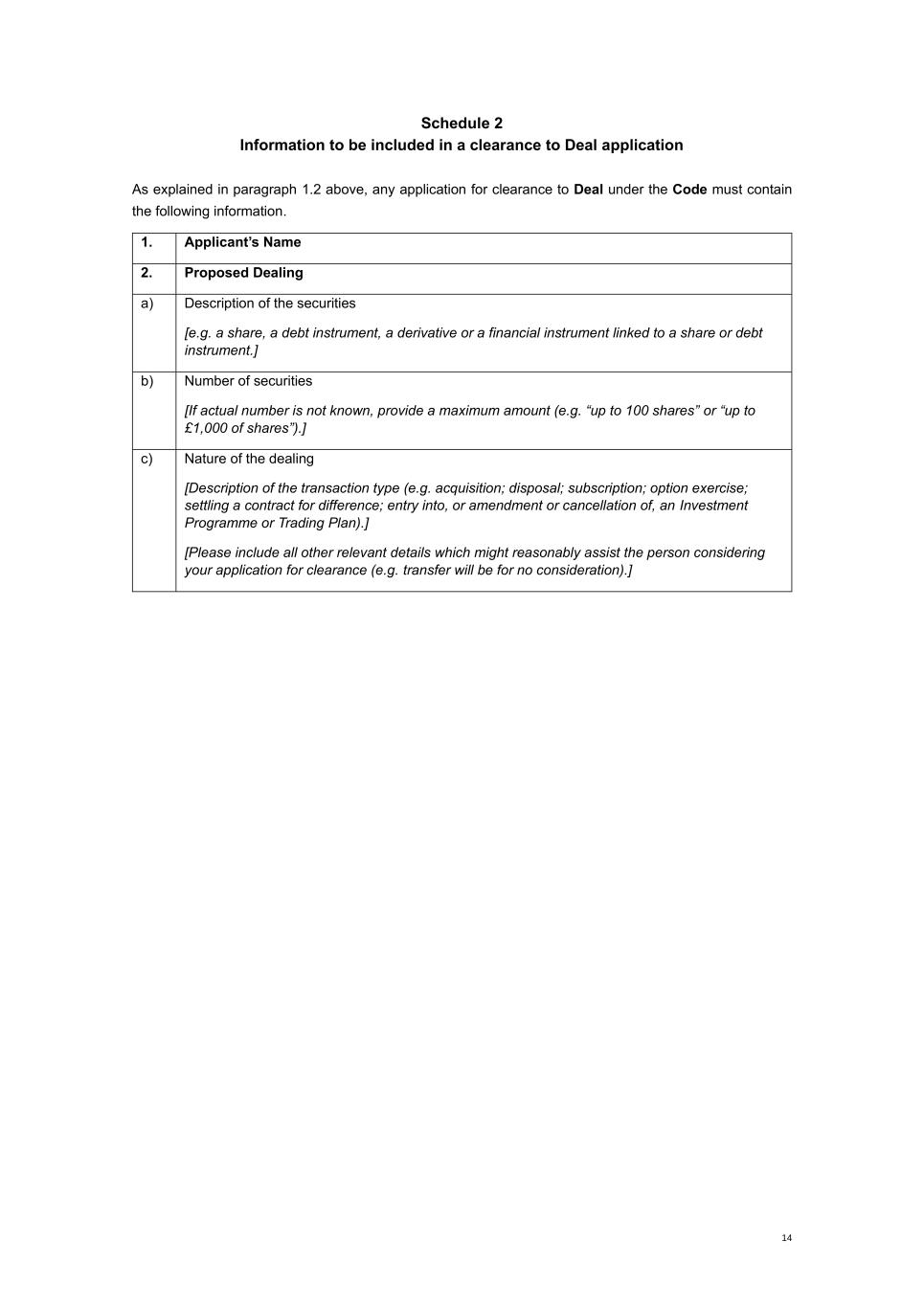
14 Schedule 2 Information to be included in a clearance to Deal application As explained in paragraph 1.2 above, any application for clearance to Deal under the Code must contain the following information. 1. Applicant’s Name 2. Proposed Dealing a) Description of the securities [e.g. a share, a debt instrument, a derivative or a financial instrument linked to a share or debt instrument.] b) Number of securities [If actual number is not known, provide a maximum amount (e.g. “up to 100 shares” or “up to £1,000 of shares”).] c) Nature of the dealing [Description of the transaction type (e.g. acquisition; disposal; subscription; option exercise; settling a contract for difference; entry into, or amendment or cancellation of, an Investment Programme or Trading Plan).] [Please include all other relevant details which might reasonably assist the person considering your application for clearance (e.g. transfer will be for no consideration).]
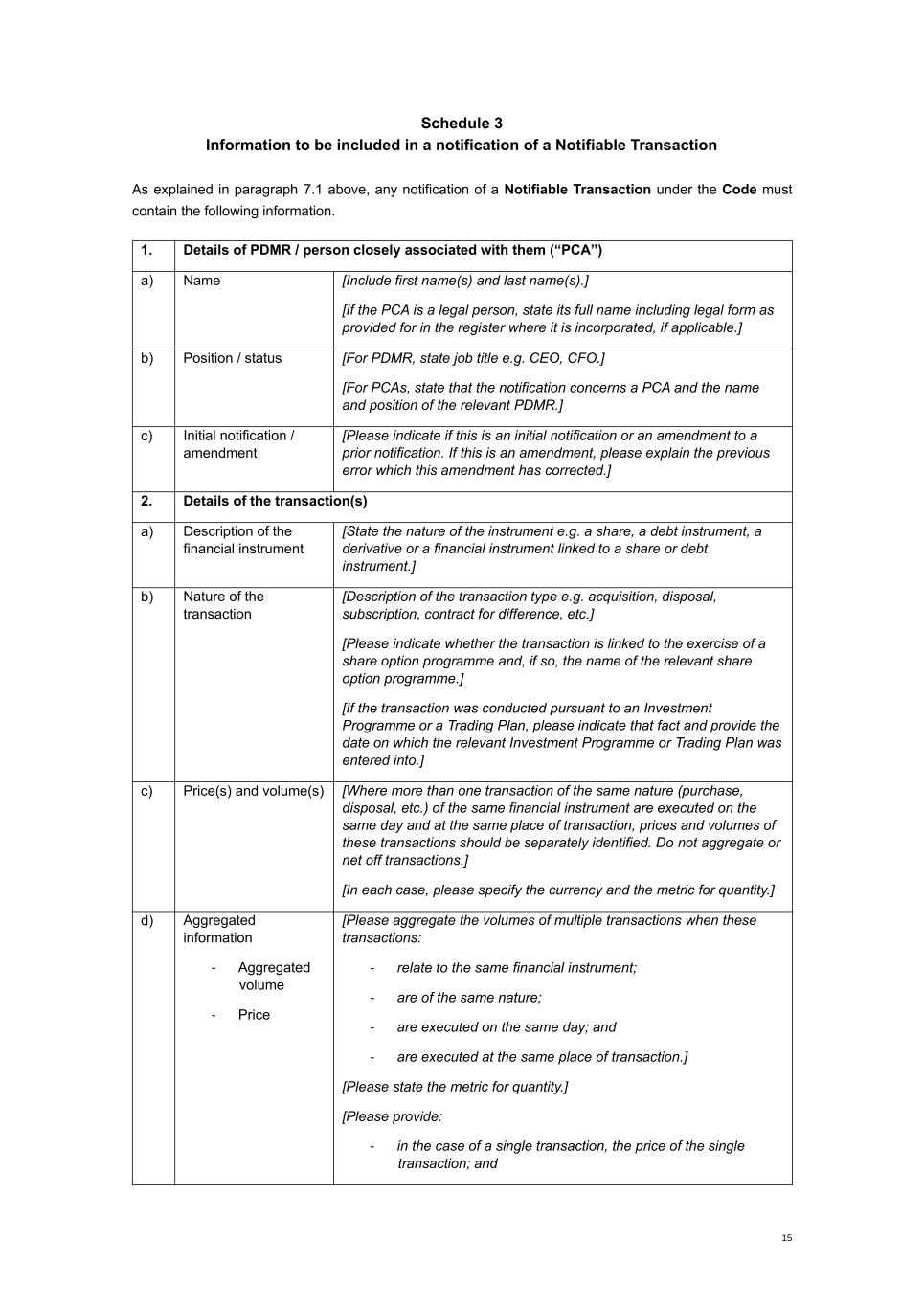
15 Schedule 3 Information to be included in a notification of a Notifiable Transaction As explained in paragraph 7.1 above, any notification of a Notifiable Transaction under the Code must contain the following information. 1. Details of PDMR / person closely associated with them (“PCA”) a) Name [Include first name(s) and last name(s).] [If the PCA is a legal person, state its full name including legal form as provided for in the register where it is incorporated, if applicable.] b) Position / status [For PDMR, state job title e.g. CEO, CFO.] [For PCAs, state that the notification concerns a PCA and the name and position of the relevant PDMR.] c) Initial notification / amendment [Please indicate if this is an initial notification or an amendment to a prior notification. If this is an amendment, please explain the previous error which this amendment has corrected.] 2. Details of the transaction(s) a) Description of the financial instrument [State the nature of the instrument e.g. a share, a debt instrument, a derivative or a financial instrument linked to a share or debt instrument.] b) Nature of the transaction [Description of the transaction type e.g. acquisition, disposal, subscription, contract for difference, etc.] [Please indicate whether the transaction is linked to the exercise of a share option programme and, if so, the name of the relevant share option programme.] [If the transaction was conducted pursuant to an Investment Programme or a Trading Plan, please indicate that fact and provide the date on which the relevant Investment Programme or Trading Plan was entered into.] c) Price(s) and volume(s) [Where more than one transaction of the same nature (purchase, disposal, etc.) of the same financial instrument are executed on the same day and at the same place of transaction, prices and volumes of these transactions should be separately identified. Do not aggregate or net off transactions.] [In each case, please specify the currency and the metric for quantity.] d) Aggregated information - Aggregated volume - Price [Please aggregate the volumes of multiple transactions when these transactions: - relate to the same financial instrument; - are of the same nature; - are executed on the same day; and - are executed at the same place of transaction.] [Please state the metric for quantity.] [Please provide: - in the case of a single transaction, the price of the single transaction; and

16 - in the case where the volumes of multiple transactions are aggregated, the weighted average price of the aggregated transactions.] [Please state the currency.] e) Date of the transaction [Date of the particular day of execution of the notified transaction, using the date format: YYYY-MM-DD and please specify the time zone.] f) Place of the transaction [Please name the trading venue where the transaction was executed. If the transaction was not executed on any trading venue, please state ‘outside a trading venue’.]















